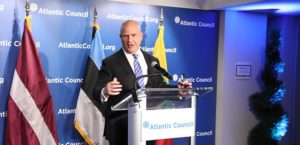
Credit: ACUS
OUTGOING NATIONAL security adviser H.R. McMaster on Tuesday became the latest senior Trump administration official to publicly warn that Western governments, including his own, are not doing enough to deter Russia’s “sustained campaign of propaganda, disinformation and political subversion,” the Washington Post reports.
“Some nations have looked the other way in the face of these threats,” Mr. McMaster said in a speech to the Atlantic Council. “Russia brazenly and implausibly denies its actions, and we have failed to impose sufficient costs.”
Russia is engaged in a long game of sustained diplomatic and political disruption. Its policy towards the liberal democracies is to undermine and divide, the Guardian adds:

DFRLAB TROLLS
It is, as we have said before, a troll state. The united response to the Skripal poisoning has set its strategy back. Yet breaking alliances remains the name of the Russian game. It must be matched with a western long game, based on evidence (which a post-Iraq public will expect to see), law and patient alliance-building.
Disinformation, providing deniability, is a key part of Russia’s “hybrid war” strategy, said Arch Puddington, from Freedom House. “Unless an assassin is actually caught in the act, on camera, the Putin leadership will deny the act, accuse the target country of lying, and play the role of aggrieved victim,” he said.
 In the contemporary information space, a growing number of news consumers feel confused and mistrustful, notes Dean Jackson, assistant program officer for the National Endowment for Democracy’s International Forum for Democratic Studies:
In the contemporary information space, a growing number of news consumers feel confused and mistrustful, notes Dean Jackson, assistant program officer for the National Endowment for Democracy’s International Forum for Democratic Studies:
Some, fearful and angry, are especially vulnerable to manipulation; others feel overwhelmed by noise and disempowered to interpret the world for themselves. In their reporting, embattled journalists must find a way to remind those audiences that independent journalism adds value to their lives, that facts matter, and that the free press is a cornerstone of democratic governance.
“Disinformation’s greatest success has been to diminish faith in these well-established tenants,” he writes for the Forum’s Power 3.o blog. “That faith is in dire need of restoration.”
“Hostile powers seek to weaken the United States by dividing us from our allies, as Russia already endeavors to do, through disinformation and other means,” according to a statement of principles released by a bipartisan group of over sixty foreign policy experts, former U.S. government officials, and former members of Congress. “For if our allies no longer share our values, they will  have little reason to help shoulder the burden of protecting our interests.”
have little reason to help shoulder the burden of protecting our interests.”
Ben Nimmo, an expert in information and disinformation at Washington D.C.-based think tank Atlantic Council, told WikiTribune that countering Russian disinformation requires “clear and consistent” statements.
“That means being careful with the language and not getting ahead of the evidence, and ultimately, it means publishing as much of the evidence as possible,” said Nimmo.







